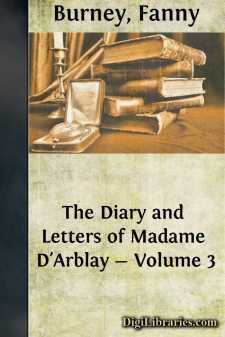Categories
- Antiques & Collectibles 13
- Architecture 36
- Art 48
- Bibles 22
- Biography & Autobiography 813
- Body, Mind & Spirit 141
- Business & Economics 28
- Children's Books 12
- Children's Fiction 9
- Computers 4
- Cooking 94
- Crafts & Hobbies 4
- Drama 346
- Education 46
- Family & Relationships 57
- Fiction 11826
- Games 19
- Gardening 17
- Health & Fitness 34
- History 1377
- House & Home 1
- Humor 147
- Juvenile Fiction 1873
- Juvenile Nonfiction 202
- Language Arts & Disciplines 88
- Law 16
- Literary Collections 686
- Literary Criticism 179
- Mathematics 13
- Medical 41
- Music 40
- Nature 179
- Non-Classifiable 1768
- Performing Arts 7
- Periodicals 1453
- Philosophy 64
- Photography 2
- Poetry 896
- Political Science 203
- Psychology 42
- Reference 154
- Religion 513
- Science 126
- Self-Help 83
- Social Science 81
- Sports & Recreation 34
- Study Aids 3
- Technology & Engineering 59
- Transportation 23
- Travel 463
- True Crime 29
The Diary and Letters of Madame D'Arblay - Volume 3
by: Fanny Burney
Categories:
Description:
Excerpt
THE FRENCH POLITICAL EMIGRANTS: MISS BURNEY MARRIES M. D'ARBLAY.
[The following section must be pronounced, from the historical point of view, one of the most valuable in the " Diary." It gives us authentic glimpses of some of the actors in that great Revolution, "the Death-Birth of a new order," which was getting itself transacted, with such terrible accompaniments, across the channel. The refugees with whom Fanny grew acquainted, and who formed the little colony at juniper Hall, near Dorking, were not the men of the first emigration—princes and nobles who fled their country, like cowards, as soon as they found themselves in danger, and reentered it like traitors, in the van of a foreign invasion. Not such were the inmates of Juniper Hall. These were constitutional monarchists, men who had taken part with the people in the early stage of the Revolution, who had been instrumental in making the Constitution, and who had sought safety in flight only when the Constitution was crushed and the monarchy abolished by the triumph of the extreme party. To the grands seigneurs of the first emigration, these constitutional royalists, were scarcely less detestable than the jacobins themselves.
A few leading facts and dates will perhaps assist the reader to a clearer understanding of the situation. September 1791, the French Assembly, having finished its work of Constitution-making, and the said [Constitution being accepted by the king, retires gracefully, and the new Assembly, constitutionally elected, meets, October 1. But the Constitution, ushered in with such rejoicings, proves a failure. The king has the right to veto the acts of the Assembly, and he exerts that right with a vengeance :—vetoes their most urgent decrees: decree against the emigrant noblesse, plotting, there at Coblenz, the downfall of their country; decree against nonjuring priests, intriguing endlessly against the Constitution. Patriot-Minister Roland remonstrates with his majesty, and the patriotic ministry is forthwith dismissed. Meanwhile distress and
Page 12
disorder are everywhere, and emigration is on the increase Abroad, Austria and Prussia are threatening invasion, and the emigrants at Coblenz are clamorous for war. War with Austria is declared, April 20, 1792; war with Prussia follows three months later; England remaining still neutral. One of our friends of juniper Hall, Madame de Staél's friend, Count Louis de Narbonne, has been constitutional minister of war, but had to retire in March, when the popular ministry—Roland's—came into office. It is evident that the king and the Assembly cannot act together; nay, the king himself feels the impossibility of it, and is already setting his hopes on foreign interference, secretly corresponding with Austria and Prussia. The people of Paris, too, feel the impossibility, and are setting their hopes on something very different. The monarchy must go; jacobins' club(1) and men of the Gironde, afterwards at death- grapple with one another, are now united on this point; they, and not a constitutional government, are the true representatives of Paris and of France....








